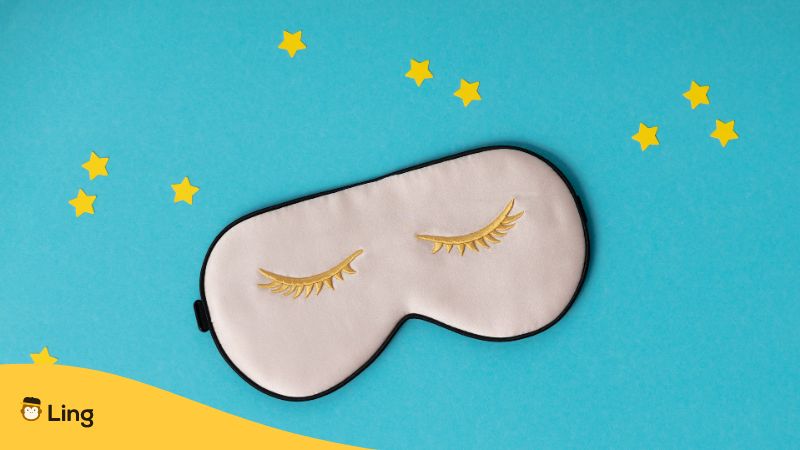Can you learn a new language while you sleep? Don’t be fooled by those who dismiss it as wishful thinking; it’s actually possible. Yes, you can learn new vocabulary words or a new language in your sleep. So, how is this possible? Let me share some insights based on facts and scientific findings about how you can learn a language in your sleep.
Take Charge Of Your Memories While You Sleep
Imagine sleep as your warm, peaceful haven, where your mind unwinds after a day of exploration. But wait, what’s this?
Your mind embarks on a mission to absorb new language while sleeping – it’s not just downtime! Enthusiastically, your brain acquires new words from a foreign language during those deep sleep stages, even though you might not be aware of it. Picture yourself as the commander of a starship.
Scientifically speaking, during deep sleep, your brain undergoes a different learning process, as if a magic door has appeared. Scientists have noticed that some brain cells become more active than usual before briefly going dormant, particularly in the early stages of slow-wave sleep. Your brain can learn new words and concepts best during these shifting stages.
The hippocampus is like a memory master in your brain, leading the sleep learning process, especially during non-sleep periods when it plays a crucial role in creating and preserving memories. During deep sleep, the hippocampus becomes extremely active, ensuring the newly learned word pairs, new sounds, and vocabulary find a comfortable home in your memory.

What Is Sleep Learning?
The brain is actively forming new neural connections while we are sleeping, so it is far from being idle. Consolidation is the process by which your brain reviews the experiences and lessons from the day. Therefore, your brain will review and memorize anything you learned while awake, such as a dance routine, a recipe, or new Spanish vocabulary.
Sleep learning, also referred to as hypnopedia, is a concept that has existed for a long time. The initial study demonstrating how sleep might aid memory and learning was published in 1914 by a German psychologist named Rosa Heine.
But is it possible to learn a language while you’re asleep? Sadly, it’s not quite that easy! If we could learn everything while we slept, we would all be napping instead of attending classes or working. However, enough sleep does aid in the consolidation process, improving your recall of information you’ve absorbed during the day.
The Influence Of A “Power Nap” On Language Development
A power nap or a quick snooze in the morning or any time of the day is beneficial. According to one study, kids who went to bed right away after learning a new word or vocabulary outperformed kids who stayed awake in class. Thus, if you’ve just finished reading those language-related books, taking a little nap can be the best approach to retaining new information and knowledge.
Can You Learn A New Language While You Sleep?
Even though you can’t fully pick up a language while you sleep, you can still make the most of it. Here’s a clever technique: Play audio recordings of words from a target language while awake, then repeat them for the first two to three hours of sleep. After that, test yourself on those words when you awaken. Try this for a few weeks before your summer vacation since consistency is important, and you might surprise yourself with how well-versed you are in the language!
How important sleep goes well beyond language lessons and language learning. Sleep is essential for human health, helping to improve everything from mood and cognition to the immune system. However, sleep deprivation can increase several health concerns, including diabetes and heart disease. Therefore, emphasize getting a good night’s sleep for your general well-being as well as your language acquisition.

How To Get A Healthier Night’s Rest
Sleeping problems? The following advice can assist you in having a more restful night:
- Caffeine might interfere with your sleep, so limit your intake, especially after 2:00 P.M.
- To prevent overstimulation, turn off screens (TV, laptop, phone) at least 30 minutes before bedtime.
- Spend some time unwinding before bed, whether by taking a bath, reading a book, or practicing meditation.
- A mind that is well-rested is a mind that is more knowledgeable.
Frequently Asked Questions About Language Learning While Sleeping
Does listening to a language at night help?
Even though learning a language at night can be advantageous, it’s not a surefire way to become fluent. According to some research, exposure to a language while you sleep, may help with memory consolidation, but it works best in conjunction with active learning throughout the day.
Does listening to words while sleeping help memorize?
Although listening to words or phrases while you sleep may have some influence on your memory, it is not a reliable method for learning new languages. While memory consolidation while you sleep might aid your learning, consistent practice and involvement in the language are necessary for improved retention.
Will you learn a language if you just listen to it?
It is doubtful that learning a language only through passive listening will result in considerable language acquisition. Language acquisition requires participation through speaking, reading, writing, and practice to properly develop all language abilities.
Which language is hardest to learn?
Depending on a person’s original language and personal learning preferences, learning a language can be challenging at different levels. Due to their various writing systems and intricate grammatical structures, languages like Mandarin Chinese, Arabic, Japanese, and Korean are sometimes regarded as difficult for English speakers.
How many hours of listening to learn a language?
The amount of time needed to learn a language varies greatly based on the complexity of the language, your prior language experience, your learning strategy, and your level of immersion.
Learn A New Language With The Help Of Ling!
While learning a language in its entirety while you sleep is a pipe dream, sleep can surely help with memory consolidation, ensuring that what you’ve learned during the day sticks. So, value your sleep and allow your brain to do its magic, whether learning language while sleeping or just trying to live a better life.
Meanwhile, you can use the Ling app to learn foreign languages in your waking hours. It employs fun, interactive, and innovative strategies to keep you engaged as you learn new words and phrases each day. Download it now on the Play Store or App Store.



































































